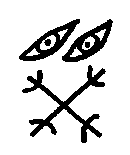I Ching, Yijing or Zhou Yi
"Oracle of the moon": © 2000 LiSe
 Yi Jing, Oracle of the Moon
Yi Jing, Oracle of the Moon

The image of hexagram 38
Kuí Squinting
What does it mean, 'inner' and 'outer trigram' (popup)
Duì below Lí: everyone is different. When Fire makes it clear how people are, especially how different and often how dangerously so, it makes you apprehensive. Who can you trust, and who should you avoid. But it also shows how similar they can be. Make good use of Fire, so you can separate good from bad.

Ideogram of the hexagram name: the upper part are two big eyes, The lower part is a shaman's tool, probably an offering mat. Kuí: obedient, violate, reverse the eyes; look angry, deviation; contrary to, enemies; glare. 睽睽 kuíkuí is to stare, to gaze. 睽离 kuílí (names of #38 and 30): leave each other, part, long separation.
The 'Great Image' says: above is the fire, below is the marsh, squinting. The noble one is similar and yet different.
Hex.38 is the contrast of 39, which is about tackling problems on your own.
Hex.38 is about knowing when to trust and when to fear.
Gui is the hexagram of ‘the others’, which may be people, or gods and spirits, or maybe even a situation which is not at all what you're used to. Stephen Field translates the name as "A Sighting", which may be a good or bad omen, something hard to interpret.
On Gui-day the oracle was consulted, and everyone was apprehensive about what would be. A good or bad harvest, an angry ancestor when one has done something wrong or forgot an offering. Many had reason for 'squinting'.
But it means also the unknown others one stares at, those one feels different from, or simply are not oneself: standing face to face with you, talking or silent, nice or unfriendly.

